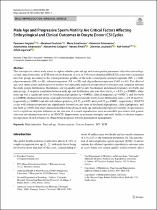| dc.description.abstract | This retrospective cohort study aimed to explore whether paternal age and semen quality parameters affect the embryological and clinical outcomes of ICSI with oocyte donation. A total of 339 oocyte donation (OD)-ICSI cycles were categorized into four groups according to the semen parameter profiles of the male counterparts: normozoospermia (NS, n = 184), oligozoospermia (OS, n = 41), asthenozoospermia (AS, n = 50), and oligoasthenozoospermia (OAS, n = 64). The effect of age, total sperm count, and progressive motility was separately analyzed for reproductive outcomes and compared between the study groups: fertilization, blastulation, and top-quality embryo rate, biochemical and clinical pregnancy, live birth, and miscarriage. A negative correlation between male age and fertilization rate was observed (rs = - 0.23, p < 0.0001), while male age was a significant factor for biochemical pregnancy (p = 0.0002), clinical pregnancy (p = 0.0017), and live birth (p = 0.0038). Reduced total sperm count and lowered progressive motility led to poorer fertilization rates (rs = 0.19 and 0.35, respectively, p < 0.0001) and affected embryo quality (rs = 0.13, p = 0.02, and rs = 0.22, p < 0.0001, respectively). OD-ICSI cycles with asthenozoospermia had significantly lowered success rates in biochemical pregnancy, clinical pregnancy, and live birth (p < 0.05). Our study demonstrated that both advanced male age and reduced progressive motility of spermatozoa exert a significant negative influence on the outcome of assisted reproduction, even in controlled procedures with gamete selection and optimization such as in OD-ICSI. Improvement in treatment strategies and male fertility evaluation requires incorporation of such evidence to obtain better prognosis towards personalized management. | en_US |

